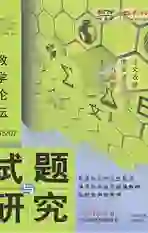被动语态小结
2015-07-06傅俊生
傅俊生

一、被动语态
英语中有两种语态,即主动语态和被动语态。主动语态表示主语是动作的执行者,被动语态表示主语为动作的承受者,被动语态常用来陈述客观事实。
二、各种时态的被动语态的构成
主动语态变被动语态时,分下面几个步骤:①主动语态句中的宾语变成被动语态句中的主语;②主动语态中的动词改为相应时态的被动语态;③主动语态句中的主语成为被动语态句中的动作的发出者;④句子的其他成分(定语、状语)不变。下面举例说明:
1.一般现在时和一般过去时的被动语态
一般现在时:am/is/are+pp.;一般过去时:was/were+ PP.例句:
a.主动:The students gave the foreign guests a warm welcome.
被动:The foreign guests were given a warm welcome by the students.
b.主动:The students regard him as their monitor.
被动:He is regarded as the students' monitor.
以上两例都是一般时态用“be done”的例子,be有人称、时态、数量变化,第三人称“foreign friends"是复数,时态一般过去时,所以“be done”就是“were given”,而“The students regard him as their monitor”一句,被动后的“be done”就变成单数第三人称“is regarded”的形式了。
2.完成时态的被动语态
(1)现在完成时:Have/has been+ pp.
例句:a.主动:We have studied English for 3 years.
被动:English has been studied for 3 years by us.(“have”随新主语变为“has”)
b.主动:They have warned us to be careful of rats
被动:We have been warned to be careful of rats by them.
(2)过去完成时:had been+pp.
例句:
a.主动:Somebody had cleaned the classroom.
被动:The classroom had been cleaned by somebody.
h.主动:They had build three buildings by last year.
被动:By last year three buildings had been built by them.
3。一般将来时的被动语态
Will/shall/be+pp.
例句:
a.主动:We shall build several big modem schools in our city next year.
被动:Several big modern school will be built in our city next year.
(“shall do”中的“shall”要随新主语变为“will",“do”要变为“be done")
b.主动:They will ask you a lot of strange questions.
被动:You will be asked a lot of strange questions by them.
被动句中的“by”引出的宾语,一般说来,如果是人称代词你、我、他等,要用宾格形式;如果是名词,不能省略。
4.过去将来时的被动语态
过去将来时,过去某时将发生:would/should be+pp.
例句:
a.主动:l never thought that he would bring me the information so early.
b.被动:I never thought that the information would be brought to me so early.
5.现在进行时和过去进行时的被动语态
现在进行时的被动语态:am/is/are+being+pp、过去进行时的被动语态:was/were+being+pp.
例句:
a.主动:Uncle Wang is repairing the radio.
被动:The radio is being repaired by Uncle Wang.
b.主动:They were having a meeting at that time.
被动:A meeting was being had at that time.
6.情态动词的被动语态
情态动词+be +pp.
例句:
a.主动:We must keep this in? mind.
被动:This must be kept in mind.
b.主动:We shall not use the washing machine again.
被动:The washing machine will not be used again.
(原来的谓语“shall use”在被动态中随新主语变为“will")
c.主动:We are going; to paint the desk yellow.
被动:The desk are going to be painted yellow.
d.主动:You neednt type this letter.
被动:This letter need not be typed.(“need"是不变助动词)
7.被动语态的否定和疑问
在否定句的被动态中,否定副词“not”一定加在第一助动词之后,不放在别的助动词之后。同样,在疑问句的被动态中,第一助动词置于主语之前。
例句:
a.Why has(一助)not anything been(二助)done to stop air pollution?
(“not”必须放在第一助动词“has”之后,第一助动词“has”必须放在主语“anything”之前。绝不可写成: Why has not been anything done to end the strike?或Why has been not anything done to stop air pollution?)
b. The exercise will not be done in class.
不可写成:The exercise will be not done in class.
8.含有双宾语主动词的被动语态
在用于被动结构时,有些动词可以带双宾语。在这种情况下,主动结构中的间接宾语变为主语时,直接宾语仍然保留在谓语后面;直接宾语变为主语时,间接宾语前通常加上介词for/to。
例l:My father gave me a gift on my tenth birthday.
I was given a gift on my tenth birthday by my father.
A gift was given to me on my tenth birthday by my father.
这类动词有give(给),pass(递),hand(传给),show(展示),teach(教),send(寄)等。
例2:Father bought me a watch
I was bought a watch by father
A watch was bought for me by father
这类动词有buy(买),make(制造),fetch(取),do(做)。
9.含有不带to的动词作宾语补足语的被动语态
有些动词后跟不带to的不定式作宾语补足语,但改为被动结构后要加上“to"。
例句:
a. We heard him? ; sing in the room just now.
-He was heard to sing in the room just now.
b. The boss made them work for 12 hours a day.
-They were made to work for 12 hours a day bythe boss.
三、被动语态的用法
1.不知道或不必说出动作的执行者时使用被动语态
例句:
When was the window broken?
How is this word book pronounced Book.
A lot of English grammar books will be published next year.
2.强调动作的承受者时使用被动语态
例句:
If you break the school rules,you will be punished.
A new Hope School will be opened in our village.
Our English teacher?is liked by everybody.
3.当动作的执行者不是人而是无生命的事物时使用被动语态
例句:
The house was washed away by the flood.
We were shocked by the news of his death.
Many accidents were caused by careless driving.
4.为了表示委婉或礼貌,避免提及动作执行者或说话者自己时使用被动语态 ; 例句:
You've been told many times riot to make thesame mistake.
Everybody is expected to obey the traffic rules.
The house must not be entered without permission.
四、不用被动语态的情况
不及物动词或动词短语无被动语态,即多数的瞬间动词rise,happen,take place等。
例句:
a.(错)The price of meat has been risen.
(对)The price has risen.
b.(错)The accident was happened last week.
(对)The accident happened last week.
c.(错)Great changes have been taken place in the last years.
(对)Great changes have taken place in the last years.
要想正确地使用被动语态,就须注意哪些动词是及物的,哪些是不及物的。特别是一词多义的动词往往有两种用法。解决这一问题唯有在学习过程中多留意积累。
五、使用被动语态时的注意事项
1.“get+过去分词”可以表被动的意义
例句:
His sister got married three years ago.
The boy got hurt on his way to school.
He got caught in the heavy rain on his way home.
类似短语:get burnt(着火)、get killed(被杀)、get hurt(受伤)、get lost(迷路);get dressed(穿衣服)、get changed(变化)、get married(结婚)、get washed(洗)等。
2.有些“动词+介词/副词”构成的固定动词短语变为被动语态时.不可分开
例句:
主动语态:We should take good care of the old and the children.
被动语态:The old and the children should be taken good care of.
3.有些由“动词+名词+介词”构成的短语动词.变成被动语态时也可以将名词和其后的介词拆开
例句:
主动语态:They make good use of the time.
被动语态:Good use is made of the time.
总之,被动语态的用法比较复杂,大家在学习中要注意积累。
